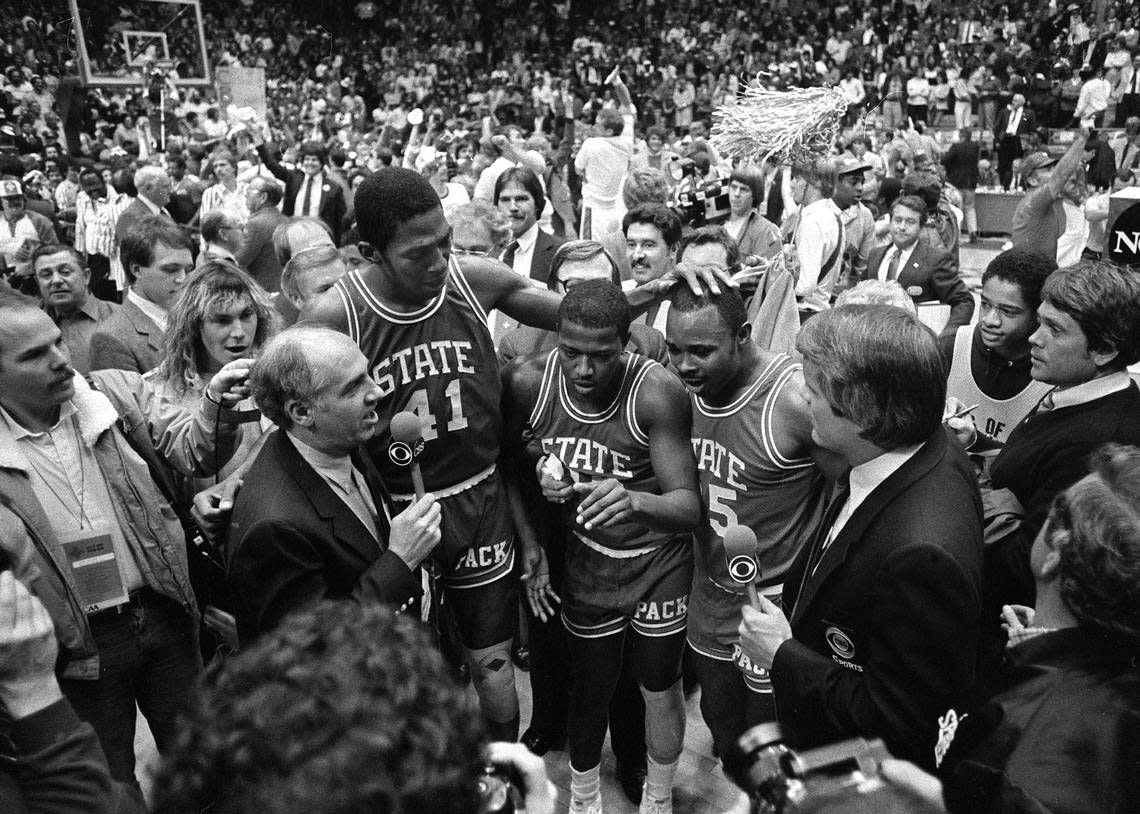‘Often wrong, but never in doubt’: Broadcast icon Billy Packer leaves memorable legacy

There won’t be another Billy Packer, and not just because Wake Forest doesn’t recruit many Polish point guards these days.
He was a contrarian and iconoclast in a broadcasting world that’s turned increasingly sycophantic. He was the voice of the glory days of the ACC at a time when that conference was at the center of the college basketball universe. He was always something different, even as a player for Bones McKinney, but he rose to the top of the hoops world — and rode the post-1979, Magic and Larry wave all the way into the 21st Century — in a media and basketball environment that no longer exists.
He was allowed, encouraged even, to be who he was. Which was, to be sure, outspoken and opinionated and even abrasive at times, but also so often pointedly critical. As college coaches became increasingly deified, Packer never bought into that hagiography. They were humans and they made mistakes, just like him, and they ought to be held accountable for them, just like he was. (And he often was!) He was the counterweight to the ebullient Dick Vitale, both of them irreplaceable and equally important to college basketball, yet in completely opposite ways.
Someone with that perspective, someone as unsparing and incisive as Packer, might not make it as big in today’s television world. The trend is toward more jovial and conversational coverage, especially at the ACC Network (which is busy innovating ways to deliver more Cory Alexander), less focused on the game itself, far more focused on glorifying the personalities involved. That’s particularly true in partnerships like ACCN and the Big Ten Network, which are invested in the league’s success and vice versa, but even ESPN and CBS.
Not that Packer was all curmudgeon. He still took tremendous joy from college basketball, exulting every bit as much in the spectacular as Vitale and Bill Raftery do now, and was every bit as irreplaceable, going from NBC to CBS when the deal changed hands.
Whether it was coincidence or not, two of his most memorable calls involved ACC teams: “They won it … on the dunk!” when Lorenzo Charles won it for N.C. State in 1983, and “This thing … is ovah” when Kansas went up 38-12 on UNC in 2008. “Is it?” Jim Nantz asked, offering a parachute. “Yes, it is,” Packer responded, throwing that parachute out the open door of the plane.
That last was his 34th and final Final Four, and while his time may have been coming anyway, calling time on a national semifinal with 27 minutes and change to go could not have pleased anyone at CBS or the NCAA. They replaced him with Clark Kellogg, who had in common with Packer the fact that both were bald and former basketball players and very little else. Raftery and Grant Hill do a great job now, and are enormously affable people, but Packer was a different breed of cat.
Packer, who died Thursday night at 82, came up in the greatest era of the ACC. After helping Wake Forest to the Final Four and working as an assistant coach there, he was on television by age 31, forming a legendary Raycom partnership with Jim Thacker for decades. If you grew up in North Carolina or Virginia or South Carolina or Maryland, Packer’s voice — with an accent that corresponded to none of them — was the narration accompanying ACC basketball.
That included what most observers believe to be the greatest game ever played, the 1974 ACC championship between N.C. State and Maryland, arguably the two best teams in the country, and only one could go to the NCAA tournament. The Wolfpack won in overtime and the rest is history.
“At some point near the end I looked at Jim (Thacker) and said, ‘I don’t want this game to end,’“ Packer said later. “He asked why and I said, ‘Someone is going to have to lose it, and I don’t want either one of these teams to lose.’ It was the finest college game I’ve ever seen.”
At the time, with the ACC preeminent in the sport, it only made sense for Packer to make the jump to a national stage. Both that ACC and college basketball at large long ago morphed into something else, as everything does with time. So did the environment that nurtured Packer and let him be who he was: In his own words, “Often wrong, but never in doubt.” It was a time of tremendous growth in the sport, more collegial and less corporate, and Packer flourished.
He would have been himself in any era. He came along at the right time and became an icon.
Never miss a Luke DeCock column. Sign up at tinyurl.com/lukeslatest to have them delivered directly to your email inbox as soon as they post.
Luke DeCock’s Latest: Never miss a column on the Canes, ACC or other Triangle sports
